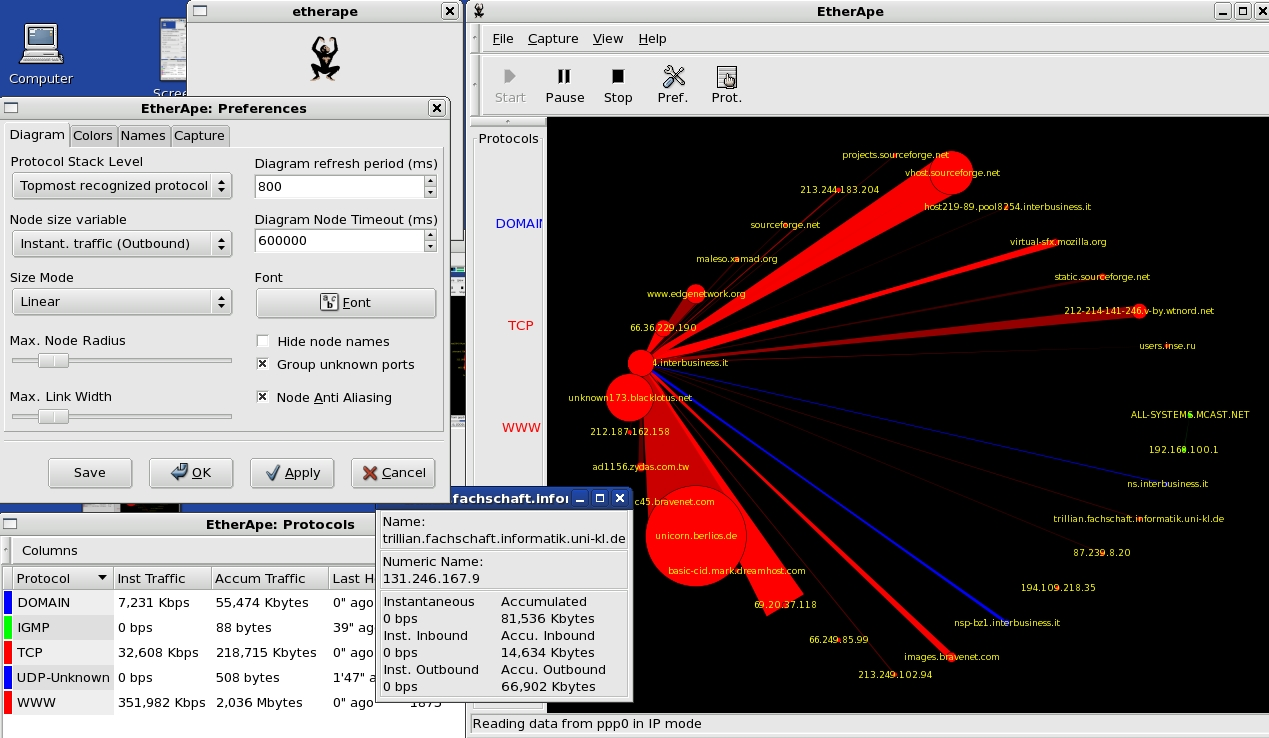Unix
EtherApe
18 March, 2010 - 11:14 — greyEtherApe is a graphical network monitor for Unix modeled after etherman. Featuring link layer, ip and TCP modes, it displays network activity graphically. Hosts and links change in size with traffic. Color coded protocols display.
It supports Ethernet, FDDI, Token Ring, ISDN, PPP and SLIP devices. It can filter traffic to be shown, and can read traffic from a file as well as live from the network.
Tcptraceroute
17 March, 2010 - 15:15 — kidtcptraceroute is a traceroute implementation using TCP packets.
The more traditional traceroute( sends out either UDP or ICMP ECHO packets with a TTL of one, and increments the TTL until the destination has been reached. By printing the gateways that generate ICMP time exceeded messages along the way, it is able to determine the path packets are taking to reach the destination.
sends out either UDP or ICMP ECHO packets with a TTL of one, and increments the TTL until the destination has been reached. By printing the gateways that generate ICMP time exceeded messages along the way, it is able to determine the path packets are taking to reach the destination.
The problem is that with the widespread use of firewalls on the modern Internet, many of the packets that traceroute( sends out end up being filtered, making it impossible to completely trace the path to the destination. However, in many cases, these firewalls will permit inbound TCP packets to specific ports that hosts sitting behind the firewall are listening for connections on. By sending out TCP SYN packets instead of UDP or ICMP ECHO packets, tcptraceroute is able to bypass the most common firewall filters.
sends out end up being filtered, making it impossible to completely trace the path to the destination. However, in many cases, these firewalls will permit inbound TCP packets to specific ports that hosts sitting behind the firewall are listening for connections on. By sending out TCP SYN packets instead of UDP or ICMP ECHO packets, tcptraceroute is able to bypass the most common firewall filters.
IP Filter
17 March, 2010 - 15:12 — kidIPFilter is a software package that can be used to provide network address translation (NAT) or firewall services. To use, it can either be used as a loadable kernel module or incorporated into your UNIX kernel; use as a loadable kernel module where possible is highly recommended. Scripts are provided to install and patch system files, as required.
Sguil
17 March, 2010 - 15:07 — kidSguil (pronounced sgweel) is built by network security analysts for network security analysts. Sguil's main component is an intuitive GUI that provides access to realtime events, session data, and raw packet captures. Sguil facilitates the practice of Network Security Monitoring and event driven analysis. The Sguil client is written in tcl/tk and can be run on any operating system that supports tcl/tk (including Linux, *BSD, Solaris, MacOS, and Win32).
Argus
12 March, 2010 - 01:26 — kidA generic IP network transaction auditing tool
Argus is a fixed-model Real Time Flow Monitor designed to track and report on the status and performance of all network transactions seen in a data network traffic stream. Argus provides a common data format for reporting flow metrics such as connectivity, capacity, demand, loss, delay, and jitter on a per transaction basis. The record format that Argus uses is flexible and extensible, supporting generic flow identifiers and metrics, as well as application/protocol specific information.
BASE
12 March, 2010 - 01:23 — kidBASE is the Basic Analysis and Security Engine. It is based on the code from the Analysis Console for Intrusion Databases (ACID) project. This application provides a web front-end to query and analyze the alerts coming from a SNORT IDS system.
Fping
12 March, 2010 - 01:19 — kidfping is a ping(1) like program which uses the Internet Control Message Protocol (ICMP) echo request to determine if a host is up. fping is different from ping in that you can specify any number of hosts on the command line, or specify a file containing the lists of hosts to ping. Instead of trying one host until it timeouts or replies, fping will send out a ping packet and move on to the next host in a round-robin fashion. If a host replies, it is noted and removed from the list of hosts to check. If a host does not respond within a certain time limit and/or retry limit it will be considered unreachable.
Unlike ping, fping is meant to be used in scripts and its output is easy to parse.
Stunnel
12 March, 2010 - 01:13 — kidA general-purpose SSL cryptographic wrapper
The stunnel program is designed to work as an SSL encryption wrapper between remote client and local (inetd-startable) or remote server. It can be used to add SSL functionality to commonly used inetd daemons like POP2, POP3, and IMAP servers without any changes in the programs' code. It will negotiate an SSL connection using the OpenSSL or SSLeay libraries.
Unicornscan
12 March, 2010 - 01:09 — kidUnicornscan is an attempt at a User-land Distributed TCP/IP stack. It is intended to provide a researcher a superior interface for introducing a stimulus into and measuring a response from a TCP/IP enabled device or network. Although it currently has hundreds of individual features, a main set of abilities include:
* Asynchronous stateless TCP scanning with all variations of TCP Flags.
* Asynchronous stateless TCP banner grabbing
* Asynchronous protocol specific UDP Scanning (sending enough of a signature to elicit a response).
* Active and Passive remote OS, application, and component identification by analyzing responses.
* PCAP file logging and filtering
* Relational database output
* Custom module support
* Customized data-set views
Yersinia
2 March, 2010 - 02:27 — kidYersinia is a network tool designed to take advantage of some weaknesses in different network protocols. It pretends to be a solid framework for analyzing and testing the deployed networks and systems.

